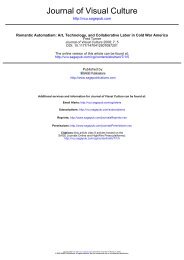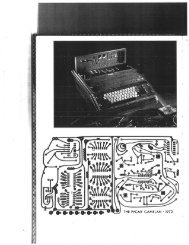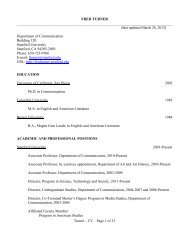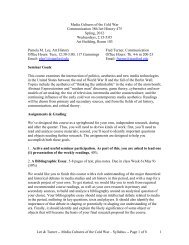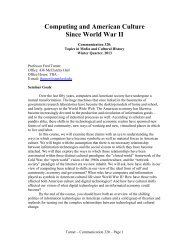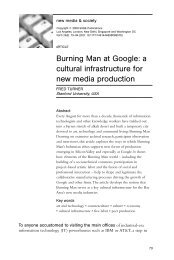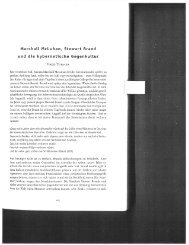The Family of Man and the Politics of Attention in ... - Public Culture
The Family of Man and the Politics of Attention in ... - Public Culture
The Family of Man and the Politics of Attention in ... - Public Culture
You also want an ePaper? Increase the reach of your titles
YUMPU automatically turns print PDFs into web optimized ePapers that Google loves.
<strong>Public</strong> <strong>Culture</strong><br />
tory emerged. By revisit<strong>in</strong>g that context, we can restore <strong>the</strong> long- forgotten l<strong>in</strong>ks<br />
between <strong>the</strong> aes<strong>the</strong>tics <strong>of</strong> Road to Victory <strong>and</strong> <strong>The</strong> <strong>Family</strong> <strong>of</strong> <strong>Man</strong>, <strong>the</strong> psychology<br />
<strong>of</strong> what was <strong>the</strong>n called <strong>the</strong> “democratic personality,” <strong>and</strong> <strong>the</strong> ideal <strong>of</strong> a simultaneously<br />
diverse <strong>and</strong> unified American public. In light <strong>of</strong> this history, <strong>The</strong> <strong>Family</strong><br />
<strong>of</strong> <strong>Man</strong> looks far less like an attempt to erase human dist<strong>in</strong>ctions than it does an<br />
effort to model a mode <strong>of</strong> governance that might susta<strong>in</strong> <strong>the</strong>m.<br />
At <strong>the</strong> start <strong>of</strong> World War II, American psychologists, sociologists, <strong>and</strong> even<br />
many artists agreed: totalitarianism was a psychological as well as a political<br />
condition. Confronted with <strong>the</strong> question <strong>of</strong> how nations as cultured as Germany<br />
or Italy or Japan could have rallied beh<strong>in</strong>d dictators <strong>and</strong> taken up arms, American<br />
<strong>in</strong>tellectuals po<strong>in</strong>ted to authoritarian trends <strong>in</strong> family structures <strong>and</strong> <strong>in</strong> <strong>the</strong><br />
use <strong>of</strong> mass media. Most focused on <strong>the</strong> German case, <strong>and</strong> many agreed with<br />
Frankfurt School refugee Max Horkheimer. Writ<strong>in</strong>g immediately after <strong>the</strong> war,<br />
he described <strong>the</strong> typical German family <strong>in</strong> <strong>the</strong> pre- Hitler years as a cauldron <strong>of</strong><br />
submerged emotion, ruled over by a brutal fa<strong>the</strong>r — a fa<strong>the</strong>r whose cruelty was<br />
amplified by <strong>the</strong> economic chaos <strong>of</strong> <strong>the</strong> Weimar years. Children <strong>in</strong> such a family<br />
obeyed <strong>the</strong>ir fa<strong>the</strong>r, yet <strong>the</strong>y also looked outside <strong>the</strong> family, to higher authorities<br />
who might give <strong>the</strong>m love, respect, <strong>and</strong> an economically effective station <strong>in</strong> <strong>the</strong><br />
world. Adolf Hitler when he came to power, Horkheimer suggested, became that<br />
external, paternal authority, <strong>and</strong> German citizens became his obedient children.<br />
Even as <strong>the</strong> mass militarization <strong>of</strong> German society <strong>in</strong> <strong>the</strong> 1930s fractured families,<br />
<strong>the</strong> Nazis depicted Germany as a national family, united by shared bloodl<strong>in</strong>es,<br />
under assault by racial <strong>and</strong> sexual <strong>in</strong>feriors. 12 In 1938 <strong>the</strong> first sentence <strong>of</strong><br />
<strong>The</strong> Nazi Primer — a sort <strong>of</strong> Boy Scout manual for Nazi youth — put it this way:<br />
“<strong>The</strong> foundation <strong>of</strong> <strong>the</strong> National Socialist outlook on life is <strong>the</strong> perception <strong>of</strong> <strong>the</strong><br />
unlikeness <strong>of</strong> men.” 13<br />
Accord<strong>in</strong>g to Horkheimer <strong>and</strong> many o<strong>the</strong>r analysts at <strong>the</strong> time, Hitler succeeded<br />
<strong>in</strong> promot<strong>in</strong>g <strong>the</strong> notion <strong>of</strong> <strong>the</strong> nation as a family <strong>and</strong> enforc<strong>in</strong>g racial<br />
<strong>and</strong> sexual dist<strong>in</strong>ctions <strong>in</strong> large part through <strong>the</strong> help <strong>of</strong> mass media. <strong>The</strong> rise<br />
<strong>of</strong> <strong>in</strong>dustrialism had atomized society, <strong>and</strong> mass media had gradually become a<br />
centralized force with which to keep <strong>in</strong>dividuals productive with<strong>in</strong> <strong>the</strong> system as<br />
a whole. When Hitler came to power, he appropriated that apparatus, yoked it to<br />
terrorism, <strong>and</strong> dramatically amplified its atomiz<strong>in</strong>g effects. Thanks to mass ral-<br />
12. Max Horkheimer, “Authoritarianism <strong>and</strong> <strong>the</strong> <strong>Family</strong> Today,” <strong>in</strong> <strong>The</strong> <strong>Family</strong>: Its Function <strong>and</strong><br />
Dest<strong>in</strong>y, ed. Ruth N<strong>and</strong>a Anshen (New York: Harper, 1949), 359–74.<br />
13. Fritz Brennecke, Paul Gierlichs, William Edward Dodd, Harwood Lawrence Childs, <strong>and</strong><br />
Hitler- Jugend, <strong>The</strong> Nazi Primer: Official H<strong>and</strong>book for School<strong>in</strong>g <strong>the</strong> Hitler Youth, trans. Harwood<br />
Lawrence Childs (New York: Harper, 1938), 5.<br />
62



